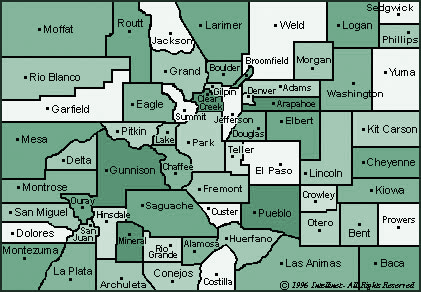Counties
Counties
Choose a county from the list below to learn more.

Colorado County Structure
Traditionally counties have been considered to be a subdivision of state government existing to administer state programs at a local level.
Although counties were originally designed primarily to serve rural areas, county boundaries include both urban and rural areas. Consequently county government in Colorado is responsible for performing functions in all areas of the county, both urban and rural.
As an administrative branch of government, counties do not have a court system of their own. They possess no inherent legislative powers and may exercise only those delegated to them by the General Assembly.
The basic organizational structure of all Colorado counties is the same, except for the home rule counties (Pitkin and Weld) and the City and County of Denver and Broomfield City and County. Broomfield and Denver are organized under a charter pursuant to article XX of the Colorado Constitution. Pitkin and Weld counties are organized pursuant to article XIV, section 16, of the Colorado Constitution and C.R.S. 30-11-501, et seq., which allow voters of a county to adopt a home rule charter establishing the organization and structure of county government, and pursuant to C.R.S 30-35-101, et seq., which further implement constitutional provisions regarding home rule.
Home rule counties are required to provide all mandatory programs, services and facilities required by state law. A home rule county is permitted to provide such “permissive” programs, services and facilities as may be authorized by state law. In this sense, home rule counties enjoy no more prerogatives than statutory counties.
Article XIV of the Colorado Constitution also establishes the organization and structure of non-home rule counties.
Board of County Commissioners
Boards of county commissioners serve as both administrative and policy-making bodies for their counties. While, generally, boards have only those powers specifically conferred by the state General Assembly, courts have held that they have such implied powers as may be necessary to carry out their specified powers. Constitutionally, the board also sits as the county board of equalization. The board also fills all vacancies in county offices other than those for county commissioner and for public trustee. All powers of the county , as a legal entity, are exercised by the board of county commissioners and not by its individual members.
County Clerk and Recorder
By state constitution, the clerk and recorder is required to be the recorder of deeds and the clerk to the board of county commissioners. By tradition, the clerk and recorder is usually the primary administrative officer of most counties. By law, the clerk and recorder is responsible for carrying out certain state functions. The clerk is the agent of the state Department of Revenue and, among other duties, is charged with the responsibility of administering state laws relating to motor vehicles, certification of automobile titles, and motor vehicle registration. The clerk is also responsible for administering all primary, general, and special elections held in the county, and for registration of voters, publication of notice of elections, appointment of election judges, and printing and distribution of ballots. The clerk and recorder also issues marriage licenses, maintains records and books for the board of commissioners, collects a multitude of license fees and charges required by the state maintains property records, and furnishes deed abstracts upon request.
County Assessor
The county assessor is responsible for valuing real and personal property with the highest standards of professionalism, using the broadest application of proper appraisal methods, techniques and standards available, in order to assure statewide equalization in the valuation of real and personal property. The assessor determines the equitable value of property to ensure that each taxpayer pays only his or her fair share of the taxes while maintaining the principle of local control and providing information to the public so they might acquire a better understanding of the appraisal and assessment process.
The assessor is required to send out a notice of valuation each year to property owners. This notice will reflect a value on property for ad valorem taxes payable to the county.
County Treasurer
The treasurer of each county is responsible for the receipt, custody and disbursement of county funds. The treasurer is the public trustee, except in first and second class counties. The treasurer collects some state taxes and all property taxes – including those for other units of local government. The treasurer collects and disburses school funds belonging to school districts located within the county. The treasurer sends notices of and collects all property taxes for all local governments and disburses receipts for each after charging a statutory collection fee. The treasurer conducts sales of property for delinquent taxes.
County Sheriff
The county sheriff is the chief law enforcement officer of the county, responsible for maintaining the peace and enforcing state criminal laws. The sheriff must attend court and is required to serve and execute processes, subpoenas, writs and orders as directed by the court. The sheriff operates the county jail, and must maintain and feed prisoners. The sheriff is also fire warden for prairie or forest fires in the county. Finally, the sheriff performs certain functions in connection with sales of real and personnel property to satisfy debt or tax liens.
County Coroner
A coroner is elected for the term of four years. Candidates for the position are encouraged by the General Assembly to possess knowledge and experience in the medical-legal investigation of death. It is also the intent of the General Assembly that those individuals holding this office participate in programs designed to develop and enhance their qualifications in fulfilling the duties and responsibilities associated with the office. The coroner may declare an individual dead if he finds the individual has sustained irreversible cessation of circulatory and respiratory function.
County Surveyor
The surveyor’s duties are relatively few and relate to: a. settle boundary disputes when directed by a court or when requested by interested parties; and b. create survey markers and monuments, and conduct surveys relating to toll roads and reservoirs.
County Attorney
The Colorado Constitution states that the county attorney may be elected or appointed. Statutes state that the county attorney shall be appointed. The county attorney advises other county officers on all legal matters and is required to represent the state in certain types of juvenile and mental health proceedings.







